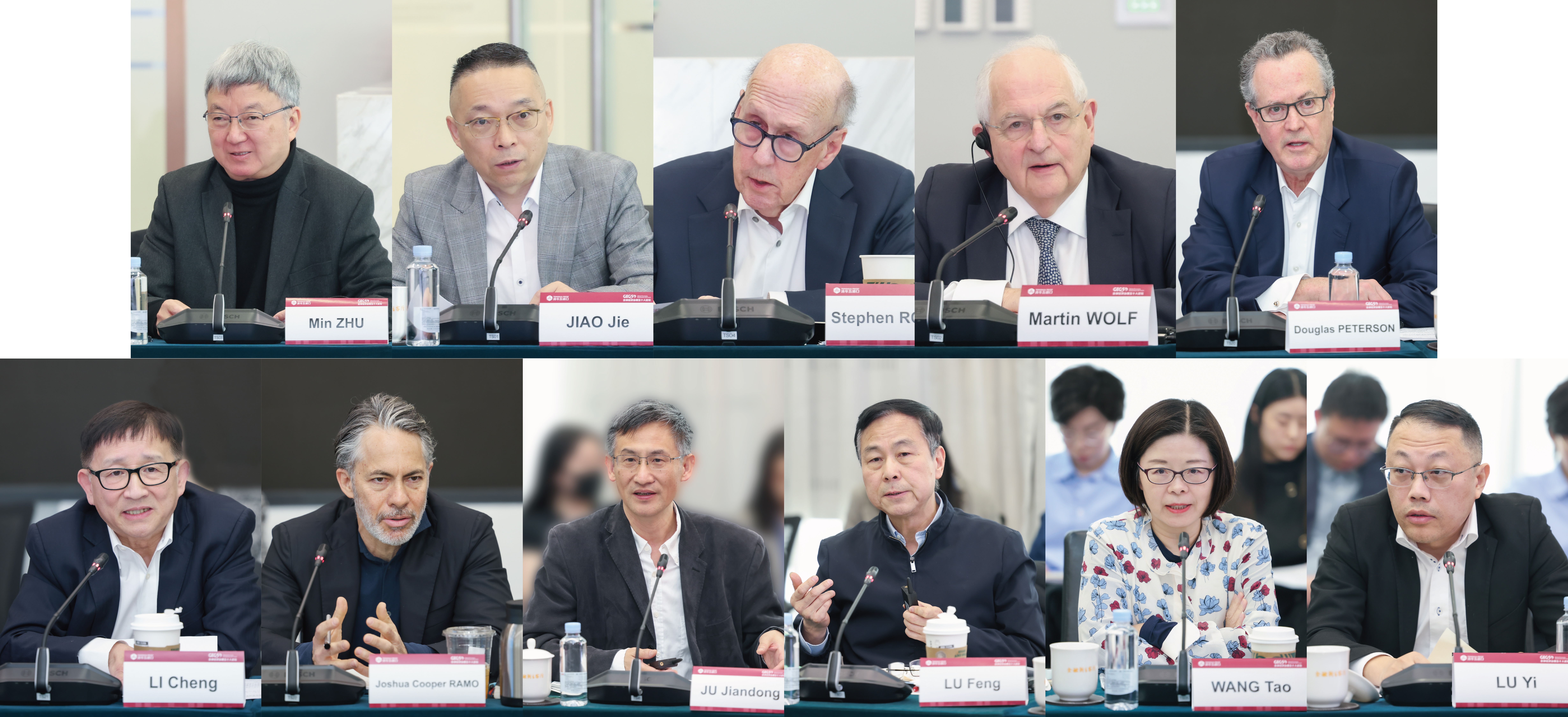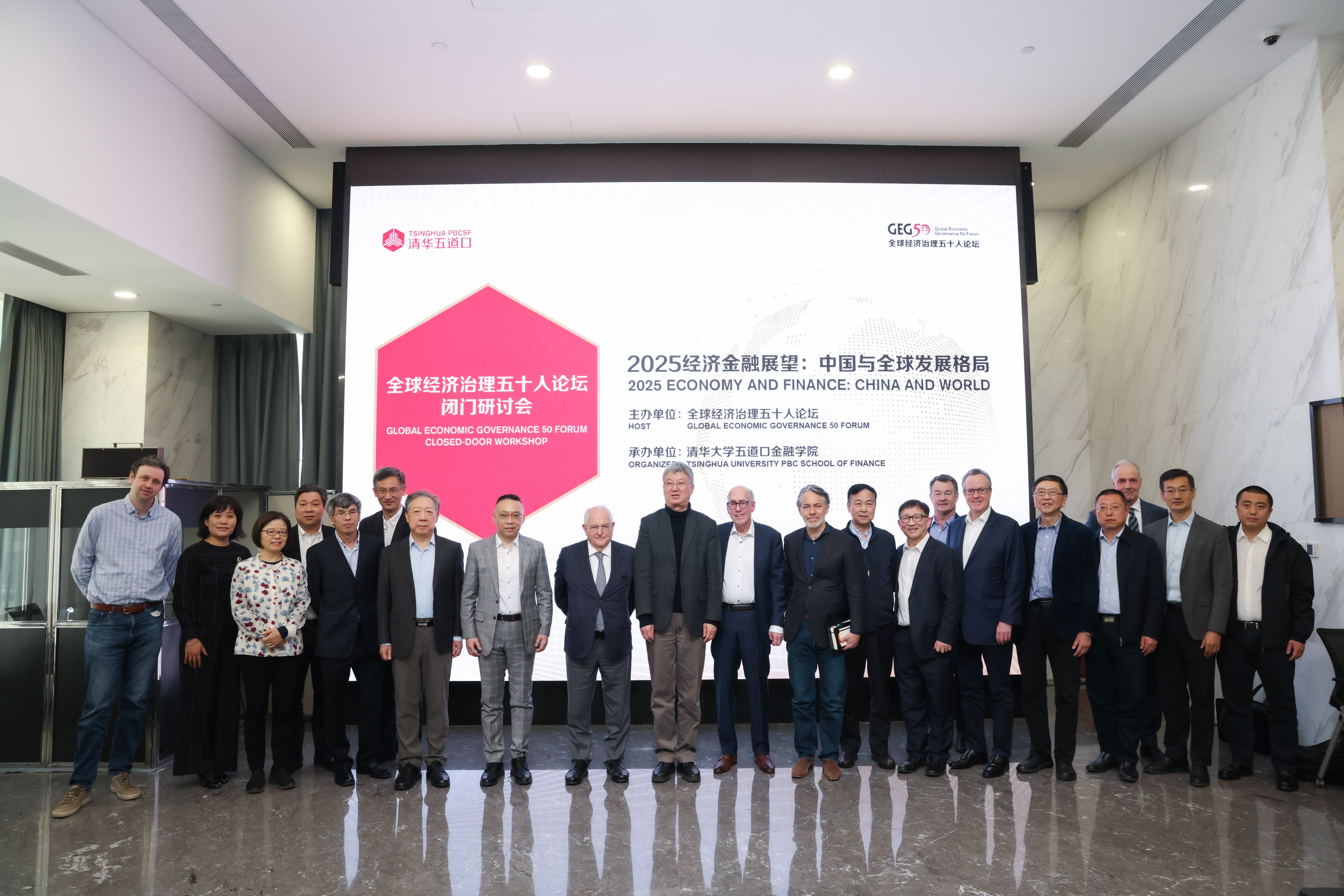On March 22, the Global Economic Governance 50 Forum held a closed-door seminar titled “2025 Economy and Finance: China and World,” focusing on China's economy, China–U.S. relations, and global development issues under geopolitical risks. The seminar featured keynote speeches from Stephen Roach, Senior Fellow at the Paul Tsai China Center of Yale Law School; Martin Wolf, Associate Editor and Chief Economics Commentator at the Financial Times; Douglas Peterson, Senior Advisor at S&P Global; Li Cheng, Founding Director and Professor at the Centre on Contemporary China and the World at the University of Hong Kong; Joshua Cooper Ramo, Chairman and CEO of Sornay; Ju Jiandong, Chair Professor and Director of the Center for International Finance and Economic Research at Tsinghua University PBC School of Finance; Lu Feng, Professor at the National School of Development of Peking University; Wang Tao, Head of Asia Economic Research and Chief China Economist at UBS; and Lu Yi, Professor at Tsinghua University PBC School of Finance. The seminar was chaired by Zhu Min, former Deputy Managing Director of the IMF and former Deputy Governor of the People’s Bank of China. Jiao Jie, Dean of the Tsinghua University PBC School of Finance, delivered the opening remarks. Experts and members of the Global Economic Governance 50 Forum, among other guests, attended the seminar.

Pictured are the keynote speakers, from left to right, top to bottom: Zhu Min, Jiao Jie, Stephen Roach, Martin Wolf, Douglas Peterson, Li Cheng, Joshua Cooper Ramo, Ju Jiandong, Lu Feng, Wang Tao, Lu Yi
Jiao Jie delivered the opening remarks, presenting three key insights on global economic development and governance. He noted that the global economy is currently facing risks of stagnation, divergence and distress; China is leveraging new productive forces to overcome growth bottlenecks and promote high-quality development; and China is transitioning from a rule follower to a system leader in global governance. In addition, Jiao introduced recent developments of the school in areas such as the Global Economic Governance 50 Forum, the 2025 Tsinghua PBC Global Finance Forum, the School’s international strategy, and its Tongzhou campus. He also expressed sincere gratitude to all guests for their support of both the school’s development and this seminar.
In the keynote speeches, Stephen Roach pointed out that the policies of “Trump 2.0” have severely affected both the United States and the global order, significantly eroding mutual trust between nations. He noted that China has actively responded to tariff shocks through measures such as diversifying international trade and boosting domestic consumption, while still having room for further adjustment in areas like the social safety nets. However, the tariff impact is expected to cause a 0.5% contraction in the global economy and disrupt global supply and industrial chains, raising concerns about global stagflation.
Martin Wolf argued that Trump transformed the political landscape of the United States over the past century, yet his ideas lack a coherent system, and policies such as high tariffs cannot achieve the goal of American reindustrialization. He suggested that in response to the impact of “Trump 2.0,” China and Europe should join forces to promote economic globalization and better achieve their respective domestic strategic transitions. For China, the key lies in forming a growth model centered on domestic demand.
Douglas Peterson reviewed the performance of the U.S. capital markets before and after Trump took office, highlighting that the S&P 500 Index dropped by more than 500 points following Trump’s inauguration, with policy uncertainty—especially tariff policies—being one of the major factors. Meanwhile, the probability of the Federal Reserve cutting interest rates decreased significantly after Trump took office. Peterson believes that while U.S. capital markets have unique advantages, the current lack of business confidence may alter original merger, acquisition, and investment decisions.
Li Cheng pointed out that the U.S. relationships with other countries have undergone an irreversible rupture, delivering a major shock to the global system. While some of Trump’s policies align with the logic of domestic political confrontation and foreign policy isolationism in the U.S., they have also intensified internal divisions and sparked serious political issues. He advised that China should be well-prepared for Trump administration measures beyond tariffs.
Joshua Cooper Ramo traced the changes in economic and social development and intellectual thought over the past 300 to 400 years, suggesting that the element of innovation provides ample reason for optimism. He elaborated on the new developments of the past decade in the global socio-economic landscape, including re-globalization no longer centered solely on the U.S., declining brand attention, and a shift from platform-based systems to higher degrees of interconnectivity. He emphasized the importance of world peace and noted that the role the United States plays in maintaining it has transformed.
Ju Jiandong proposed a framework of “reverse Nixon shock” to rationally interpret “Trump 2.0” policies. He argued that in the post-Bretton Woods system under Nixon, the dollar’s status rose while U.S. manufacturing declined, reaching a historical turning point. As a result, the Trump administration adopted policies aimed at restoring relations with Russia, reviving American manufacturing, devaluing the dollar, and maintaining holdings of U.S. debt. Ju suggested that China should seize the window of capital account liberalization, maintain robust growth in green transition sectors, and promote further regional trade integration.
Lu Feng analyzed changes in China’s trade surplus since the 14th Five-Year Plan from the perspectives of total volume, structure, industries, regional distribution, and trade conflicts. He noted that China’s trade surplus—particularly in manufactured goods and trade with developing countries—has been on the rise in recent years. The root cause lies in the domestic imbalance between strong supply and weak demand, making rebalancing an optimal strategy for integrating internal and external efforts to drive China’s economic development amid rising external trade tensions.
Wang Tao stated that China’s economy faces multifaceted challenges, both domestic and international, and in both the short and long term—challenges that the Chinese government is fully aware of. She argued that although fiscal spending has increased, there remains substantial room to expand spending in areas such as social safety nets and public services. The Chinese government strongly supports technological innovation, but must also address issues like capital expenditure and employment. In terms of structural transformation, she highlighted potential reforms including managing supply-side coordination, resolving long-term fiscal issues of local governments, and reforming the social security system to adapt to an aging society.
Lu Yi shared findings from his research, along with those of other scholars, on the “Trump 1.0” period. During that time, China successfully redirected exports away from the U.S. to other countries, minimizing the overall impact. U.S. tariffs were fully passed on to American consumers, with only minor effects on welfare and GDP. However, the scope, intensity, and targets of “Trump 2.0” have all expanded and require further observation and study. Lu believes that the U.S.’s various withdrawals from international agreements have had the greatest impact on global trade, directly undermining global economic governance and cooperation.
Finally, in the closing session, Martin Wolf emphasized that despite today’s challenges, there are still many reasons for optimism, and the world will not regress to the chaos of Religious Wars in Europe 500 years ago. Nonetheless, new mechanisms and institutions are needed to address today’s problems. He noted that the U.S. government opposes world wars and that there remains significant potential for future cooperation and development between China and Europe. From the perspective of human development, technology continues to innovate, and globalization has not disappeared. Zhu Min concluded that the world is entering the beginning of a long-term transformation, the core features of which have yet to fully emerge. In such a challenging era, he stressed the need for imagination, more collaboration, reconstruction of mechanisms, institutions, and systems, as well as the rebuilding of trust to find a way forward and workable solutions.

Group photo of seminar participants
This seminar was organized by the Global Economic Governance 50 Forum and hosted by the Tsinghua University PBC School of Finance.
The Global Economic Governance 50 Forum is a high-level think tank initiated by Mr. Zhu Min, former Deputy Governor of the People’s Bank of China and former Deputy Managing Director of the IMF, and hosted by the Tsinghua University PBC School of Finance. The Forum is committed to conducting independent, forward-looking and academically supported policy research on the improvement and reform of the global economic governance system, and providing solutions on how China better engages in global economic governance.